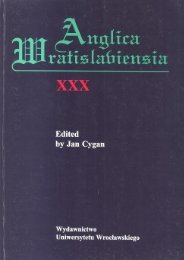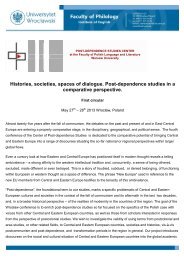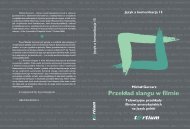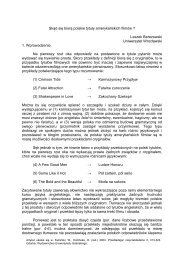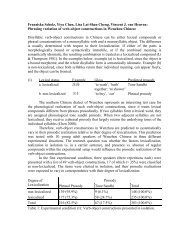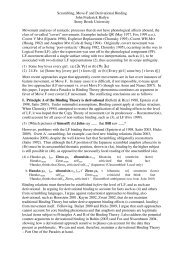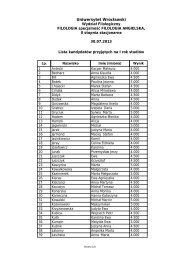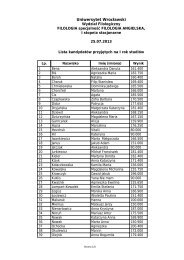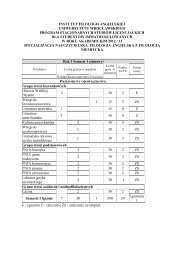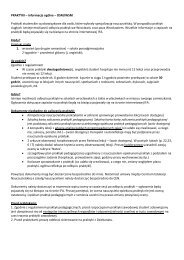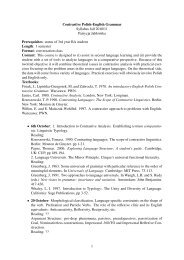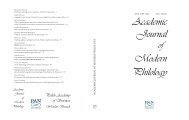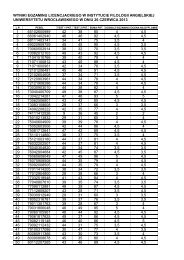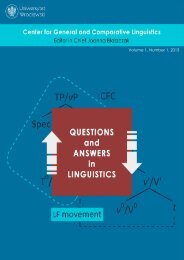- Page 1 and 2:
POLISH ACADEMY OF SCIENCES WROCŁAW
- Page 3 and 4:
Prace Komisji Nauk Filologicznych O
- Page 5:
PRZEDMOWA Mamy zaszczyt przedstawi
- Page 8 and 9:
II 18 maja 2008 roku Komisja Nauk F
- Page 10 and 11:
JĘZYK WALIJSKI - UMIERAJĄCY CZY O
- Page 12 and 13:
interested in everything that grows
- Page 14 and 15:
Scheme 1: the invisible hand intent
- Page 16 and 17:
Antlitz, haar engelachtig gelaat
- Page 18 and 19:
Reduction is also a case of economy
- Page 20 and 21:
produced. The children must guess a
- Page 22 and 23:
The second example. The official Du
- Page 24 and 25:
language. They preserve some words,
- Page 26 and 27:
In general, the higher classes resi
- Page 28 and 29:
past and especially ongoing changes
- Page 31 and 32: Izabela Białek Wrocław A linguist
- Page 33 and 34: On the nature of discourse The expl
- Page 35 and 36: - a system of principles (these pri
- Page 37 and 38: Moreover, based once again on the d
- Page 39 and 40: dialect as a regional or a social s
- Page 41 and 42: variation of language, namely, the
- Page 43 and 44: feature constituting the hunting so
- Page 45 and 46: great ignorance and an improper att
- Page 47 and 48: 61. leśniczy forester der Förster
- Page 49 and 50: 123. samura (dzik) ----------------
- Page 51 and 52: appears to be a fashionable hobby.
- Page 53: Wilkoń, Aleksander (1987) Typologi
- Page 56 and 57: poniewaŜ w analizie jakościowej,
- Page 58 and 59: manipulacji. Van Leeuwen (2005) wsk
- Page 60 and 61: Van Dijk, Teun A. (1993) “Princip
- Page 62 and 63: which, as culturally bound linguist
- Page 64 and 65: undertakings. Thus Thore’s death
- Page 66 and 67: “intratextlinguistics”, this wo
- Page 68 and 69: actually a creative projection of a
- Page 70 and 71: Iversen, Mette (2000) From Rune-sto
- Page 72 and 73: 1. Słowa i czyny Jezusa, zwłaszcz
- Page 74 and 75: zapominać - jeśli chce się popra
- Page 76 and 77: Edward T. Hall (1971: 130) distingu
- Page 78 and 79: gazer, saying that one can never fi
- Page 80 and 81: have long chats while drinking some
- Page 84 and 85: unwelcoming and mysterious space wh
- Page 86 and 87: The pub is another sociopetal space
- Page 88 and 89: much in spite of its shattered aspe
- Page 90 and 91: The domestic, intimate space become
- Page 92 and 93: The Dragon in Sadoveanu, Mihail (19
- Page 94 and 95: Material and method I will first re
- Page 96 and 97: guide to culture”, “vocabulary
- Page 98 and 99: a-i fi dor de Ńară to be homesick
- Page 100 and 101: Dor is most commonly associated wit
- Page 102 and 103: The meaning of “pain” is in (4)
- Page 104 and 105: hierarchical perspective, this mean
- Page 106 and 107: also DO, SAY and MOVE, dor being, o
- Page 108 and 109: to define dor in NSM terms. The NSM
- Page 110 and 111: X feels something sometimes a perso
- Page 112 and 113: if I did this, I would feel somethi
- Page 114 and 115: 114
- Page 116 and 117: Rozpatrywana po prostu jako powieś
- Page 118 and 119: Słownictwo erotyczne w języku pol
- Page 120 and 121: PoŜądanie Kategoria ta tematyczni
- Page 122 and 123: Oryginał Przekład polski 1 Przek
- Page 124 and 125: she sat deep in an overstuffed bloo
- Page 126 and 127: A delinquent Występna nimfetka [wy
- Page 128 and 129: Dąbrowska, Anna (2002) „Stereoty
- Page 130 and 131: the language that the interactants
- Page 132 and 133:
aforementioned conclusions could ha
- Page 134 and 135:
upkeep the conversation in oppositi
- Page 136 and 137:
Speaker Sex Nationality Age Educati
- Page 138 and 139:
constitute, it becomes clear that t
- Page 140 and 141:
specific one. Moreover, taking into
- Page 142 and 143:
[C: No, Ajaks won’t be eating a g
- Page 144 and 145:
G: Ale teraz to pewnie jeszcze te r
- Page 146 and 147:
E: Aha, around the shops H: In IKEA
- Page 148 and 149:
[E: And you stop it, because the gi
- Page 150 and 151:
that occur more frequently within t
- Page 152 and 153:
applied by men occurred in a mid-ut
- Page 154 and 155:
Example (17) Context: A question re
- Page 156 and 157:
extensively minimising the negative
- Page 158 and 159:
Holmes, Janet (1995) Women, Men and
- Page 160 and 161:
160
- Page 162 and 163:
zorientowanych literaturoznawców w
- Page 164 and 165:
pierwsze - gdyby uŜyć kategorii D
- Page 166 and 167:
pozostanie wiedzą perspektywiczną
- Page 168 and 169:
Według Althussera, dzięki temu, c
- Page 170 and 171:
dyskursywnych oraz współkreujący
- Page 172 and 173:
programów studiów filologicznych
- Page 174 and 175:
historia „rozumiana jako tło, ja
- Page 176 and 177:
trzeba zauwaŜyć, iŜ pierwszy - D
- Page 178 and 179:
178
- Page 180 and 181:
Let us consider the status of speci
- Page 182 and 183:
Whereas, this traditional and simpl
- Page 184 and 185:
Adjective Phrases can function as c
- Page 186 and 187:
There is still one important type o
- Page 188 and 189:
teachers is base-generated and that
- Page 190 and 191:
Literature Abraham, Werner, Samuel
- Page 192 and 193:
zaprezentować ideologicznie sprepa
- Page 194 and 195:
aktach zbiorowych, zachowuje cechy
- Page 196 and 197:
C1/C3/B (odległa historia/wiedza o
- Page 198 and 199:
Wnioski W kaŜdym badaniu dyskursu,
- Page 200 and 201:
200
- Page 202 and 203:
sprawozdawca będzie uŜywał inneg
- Page 204 and 205:
chociaŜ w pewnym stopniu scharakte
- Page 206 and 207:
UŜycie przywołanych w powyŜszych
- Page 208 and 209:
Odnośniki do bliskiej historii Ten
- Page 210 and 211:
przeanalizował transmisję tego sa
- Page 212 and 213:
mecze z dwóch amerykańskich lig (
- Page 214 and 215:
Mecz 2 Drugie analizowane spotkanie
- Page 216 and 217:
Dlatego teŜ w analizie tego spotka
- Page 218 and 219:
W powyŜszych informacji wynika, Ŝ
- Page 220 and 221:
Komentatorzy nie chcą juŜ poświ
- Page 222 and 223:
former include e.g. rhythm or metre
- Page 224 and 225:
frame of musical limitations must b
- Page 226 and 227:
This, again, proves that there are
- Page 228 and 229:
text. The case of altering versions
- Page 230 and 231:
target text becomes useless, even i
- Page 232 and 233:
Raffel, Burton (1998) The Art of Tr
- Page 234 and 235:
externalized semiotic materiality a
- Page 236 and 237:
2) abduction considered as inferenc
- Page 238 and 239:
or symbolic behavior. If we conside
- Page 240 and 241:
separated cognitive domain, that of
- Page 242 and 243:
A wonderful example of meaning crea
- Page 244 and 245:
4.1. External and Internal Represen
- Page 246 and 247:
In the following section I will ill
- Page 248 and 249:
Recognizing in a series of material
- Page 250 and 251:
ecome signs when we think and inter
- Page 252 and 253:
its face is also an interpretant. P
- Page 254 and 255:
Peirce considers inferential any co
- Page 256 and 257:
phenomena clearly demonstrate they
- Page 258 and 259:
(Piaget, 1974), or when we are in p
- Page 260 and 261:
If a manipulative action performed
- Page 262 and 263:
environment, where mind has objecti
- Page 264 and 265:
thoughts, proves that man is a sign
- Page 266 and 267:
Brent, J. (2000) “A Brief Introdu
- Page 268 and 269:
Kant, I., ([1770] 1968) Inaugural D
- Page 270 and 271:
Norman, D.A. (1993) Things that Mak
- Page 272 and 273:
272
- Page 274 and 275:
W największym skrócie istotę nie
- Page 276 and 277:
edukcja wyrazu prostego polegająca
- Page 278 and 279:
[v]. W dawniejszej polszczyźnie is
- Page 280 and 281:
tego rodzaju nieregularnemu rozwojo
- Page 282 and 283:
Wreszcie z pewnej gazety holendersk
- Page 284 and 285:
innych wierzchowców. Chodzi o to,
- Page 286 and 287:
której niektórzy Australijczycy s
- Page 288 and 289:
Jest kilkanaście 1-sylabowych wyra
- Page 290 and 291:
mianowicie it, przy czym it jest u
- Page 292 and 293:
Moim zdaniem wymowa ta powstała na
- Page 294 and 295:
Literatura 1 F. Diez, Altromanische
- Page 296 and 297:
the Younger Futhark 62 , czy teŜ S
- Page 298 and 299:
zaznaczyć, iŜ poszczególne inskr
- Page 300 and 301:
sytuacji komunikacyjnej, w której
- Page 302 and 303:
powszechnym szacunkiem, a monument
- Page 304 and 305:
Mediacja wyjaśnieniem komu i dlacz
- Page 306 and 307:
(oprac. na podstawie: Moltke [1976]
- Page 308 and 309:
Tekst jest w pełni informatywny i
- Page 310 and 311:
(opracowanie własne) Kryterium Pod
- Page 312 and 313:
Środowisko społeczne Sposób plan
- Page 314 and 315:
Tekst spełnia kryteria intencjonal
- Page 316 and 317:
Foote, P.G., Wilson, D.M. (1970). T
- Page 318 and 319:
dolnośląskiej poetki, Salomei Kap
- Page 320 and 321:
sposób dosłowny i skończony, teg
- Page 322 and 323:
A teraz grupa pauz wyodrębniający
- Page 324 and 325:
przez wahanie. Tego typu zjawiska
- Page 326 and 327:
trzecią wersu, czyli dwie stopy, a
- Page 328 and 329:
Przede wszystkim wyróŜniają one
- Page 330 and 331:
Literatura podmiotu Salomea Kapuśc
- Page 332 and 333:
332
- Page 334 and 335:
829). In der einschlägigen Bibliog
- Page 336 and 337:
dass es sich hier um die erste Gram
- Page 338 and 339:
wird ihre regelmäßige und unregel
- Page 340 and 341:
please? Universiteitsstraat is? Dru
- Page 342 and 343:
26. przeziębienie cold verkoudheid
- Page 344 and 345:
Angielskie: 10, Gloucester Road, S.
- Page 346 and 347:
346
- Page 348 and 349:
yła zjednoczonym krajem. Najpierw
- Page 350 and 351:
uniwersyteckie i mnóstwo tu anglik
- Page 352 and 353:
Literatura Aitchinson, J., H. Carte
- Page 354 and 355:
przypominać najcenniejsze, najbard
- Page 356 and 357:
W tej sytuacji trudno przecenić in
- Page 358 and 359:
antologii Skwarczyńskiej zamieszcz
- Page 360 and 361:
późniejsze amerykańskie badania
- Page 362 and 363:
A verbal composition, through being
- Page 364 and 365:
“formalistami”, to w zupełnie
- Page 366 and 367:
Zwłaszcza The Intentional Fallacy
- Page 368 and 369:
Richards, Ivor, Armstrong (1936) Th
- Page 370 and 371:
370
- Page 372 and 373:
To poszukiwanie własnej, „orygin
- Page 374 and 375:
samotności i przestrzeni pragnie s
- Page 376 and 377:
376
- Page 378 and 379:
3. Struktura i orientacja jest zaws
- Page 380 and 381:
Szwedek, Aleksander (2000) “The O
- Page 382 and 383:
teraźniejszego. Przedstawione fakt
- Page 384 and 385:
imiesłów prezentuje morfologię s
- Page 386 and 387:
Właściwym punktem rozpoczęcia op
- Page 388 and 389:
features) (Adger 2003: 179-181), i
- Page 390 and 391:
„C”, a podmiot w pozycji „Spe
- Page 392 and 393:
Przedstawione powyŜej proponowane
- Page 394 and 395:
Następnym etapem jest przedstawien
- Page 396 and 397:
Brinton, Laurel J. (1988) The Devel
- Page 398 and 399:
398
- Page 400 and 401:
Dr LuminiŃa Drugă zajmuje się hi
- Page 402 and 403:
Mgr Aleksandra Knapik; absolwentka
- Page 404 and 405:
fonetyce, fonologii, leksykografii,



